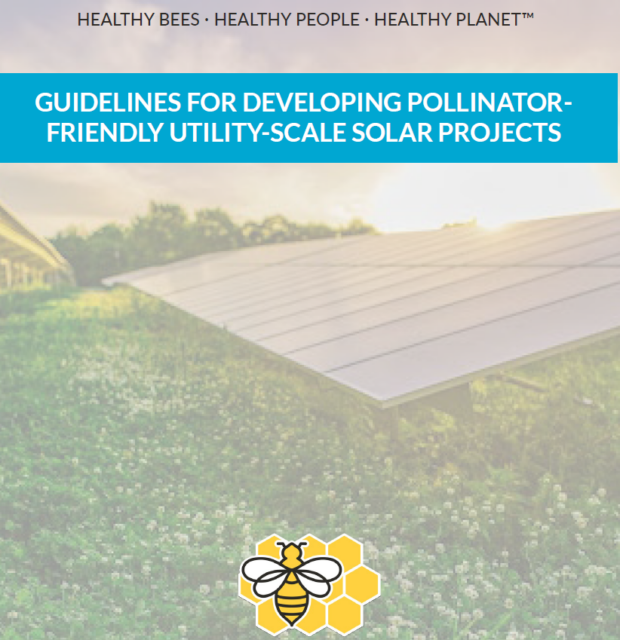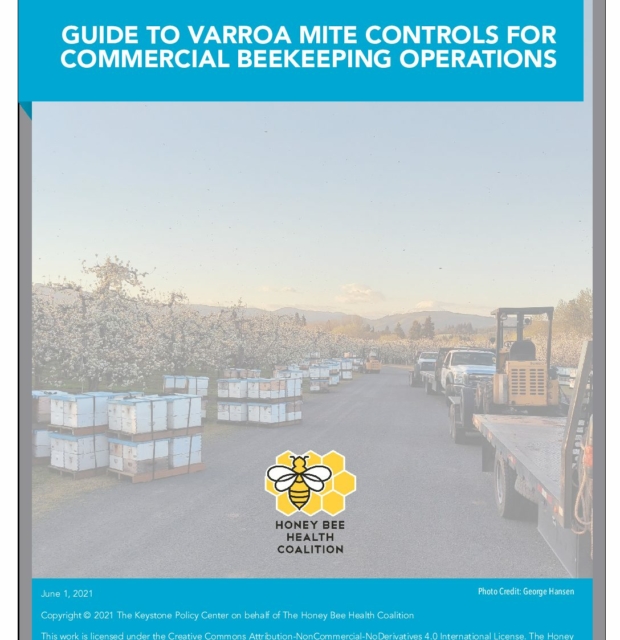News
Engaging Growers in Honey Bee Health

Farmers and bees are partners in supporting modern, production agriculture. The world counts on both to produce the food and products that are at the center of our way of life in North America and beyond. That’s why the Honey Bee Health Coalition is working across sectors to develop the tools and resources farmers need to protect pollinators and ensure honey bees thrive in agricultural landscapes.
Read on to learn how the Coalition is engaging with soybean growers and certified crop advisers, accelerating critical research around varroacides, and supporting innovative research around honey bee nutrition.
 Earlier this month at the Commodity Classic tradeshow in Anaheim, California, the Coalition unveiled a series of new best management practices for soybean growers to ensure they and honey bees can continue to work together to support healthy ecosystems and the crops consumers count on.
Earlier this month at the Commodity Classic tradeshow in Anaheim, California, the Coalition unveiled a series of new best management practices for soybean growers to ensure they and honey bees can continue to work together to support healthy ecosystems and the crops consumers count on.
Pollinator habitat and the plants bees rely upon often border soybean fields throughout North America. Soybeans can be an attractive source of pollen and nectar under certain circumstances.
These voluntary best management practices — available at honeybeehealthcoalition.org/soybmps/ — complement information already available to growers, including mandatory pesticide label instructions and advisory warnings.
Investing in Varroacide Research, Testing

Left untreated, Varroa mites can quickly spread across a region and devastate honey bee colonies. With Varroa mites adapting to the treatments currently available, the Coalition is working with a wide array of public, private, and academic partners to explore potential new compounds to help beekeepers treat and control these destructive mites.
The Coalition announced earlier this month that it has secured a more than $475,000 grant from the Foundation for Food and Agriculture Research to facilitate the testing of chemical compounds that could help beekeepers more effectively treat Varroa mites. This grant, matched by participants and industry members to provide more than $1 million in total support, also will document how mites develop resistance to treatments.
The funding will support the identification, lab testing, and field testing over the next three years of “orphaned” chemical compounds that have known acaricidal (miticide) activity but have not been specifically tested against Varroa mites. Many of these compounds are trapped in a bottleneck where the costs of testing and commercializing them are too steep for testing, effectively leaving them on the shelf.
This collaborative effort is being championed by a diverse coalition of national and international public, private, and NGO organizations, including USDA-ARS, University of Nebraska, Alberta Agriculture and Forestry Department (Canada), University of Georgia, Universitat de València (Spain), Ohio State University, and Auburn University.
In addition to the grant funding, Project Apis m. provided financial support. Other organizations also have provided in-kind support, including bees from a number of regional beekeepers and compounds from Bayer.
Nutrition Winners ICYMI

In case you missed it, the Coalition selected four teams of researchers and innovators as the winners of the inaugural Bee Nutrition Challenge. The finalists and winners presented their ideas in a “Shark Tank”-style event at the 2018 American Bee Research Conference.
The Bee Nutrition Challenge winners and awards are:
- $15,000 for Miguel Corona, Steven Cook, and Jay Evans, USDA, Agricultural Research Service, Bee Research Lab, Development and Testing of Optimal Seasonal Nutritional Supplements For Honey Bees
- $10,000 for Waled Suliman and Brandon Hopkins, Washington State University, A Novel Feed Additive for Protecting Bees and Confronting Colony Collapse Disorder
- $7,500 for Washington State University to research fungal extracts for honey bee health
- $7,500 for Jaclyn Nichols, Patrick Heritier-Robbins, Ruchi Banerjee, and Ollie Peterson, Georgia Institute of Technology, Bee Ultra Sound
Monsanto, a member of the Coalition, generously provided support for the prize funds. In addition to the prize, the winners will have full access to subject matter experts and others from the Coalition’s member organizations — including mentoring and advice.
Learn more about the Bee Nutrition Challenge, the winners, and information about their projects by visiting honeybeehealthcoalition.org/nutrition-challenge.
Crop Pest Adviser Training Module
Support honey bee health takes more than a willing grower. That’s why the Coalition developed a training module for certified crop advisers to ensure they are prepared to assist farmers who are ready to adapt their in-field practices to protect and support honey bees and other native pollinators.
The Coalition has basic resources for growers and beekeepers on its website regarding growers, applicators and beekeepers can work together to protect honey bees from unintended pesticide exposure. Certified crop advisers should look for the Coalition’s training modules at upcoming conferences.
The Coalition is working to update the modules based on feedback from recent meetings in Arizona, Michigan, and Nebraska.

Bees, butterflies, and other pollinators count on high quality habitat and forage to thrive throughout North America. The Bee and Butterfly Habitat Fund’s Seed a Legacy program — which is accepting applications through the end of this month — is taking a collaborative approach to supporting habitat on public, private, and business-held lands throughout the Midwest and Great Plains.
The program is focused on an 11-state region — Kansas, Illinois, Indiana, Iowa, Minnesota, Missouri, Nebraska, North Dakota, Ohio, South Dakota, and Wisconsin — and is accepting applications for landowners looking to improve the forage and habitat available to pollinators, including honey bees. Landowners who are selected will receive access to:
- Cost-effective pollinator habitat that is documented to produce high pollinator value.
- Free or discounted pollinator seed mixtures designed to establish quickly, better handle weed competition and provide great pollinator value.
- Proven seed mixes maximize the pollinator values for monarch butterflies, honey bees, and native pollinators.
- And an opportunity to make a difference by restoring high quality pollinator habitat within the critical landscape defined in the National Pollinator Partnership Action Plan
The Bee and Butterfly Habitat Fund is accepting applications for projects of two acres or more through March 31. Grantees are expected to plant their projects starting this spring. A second application period will follow later this year for fall plantings.
To learn more and apply, visit beeandbutterflyfund.org/.

